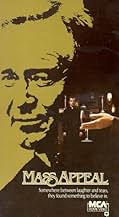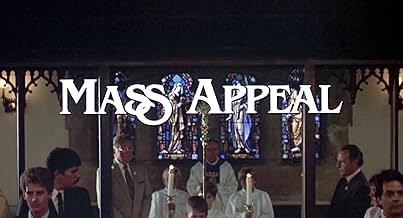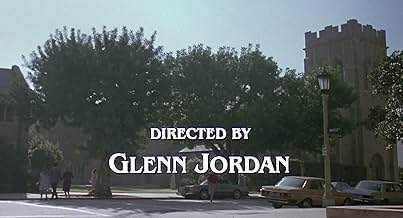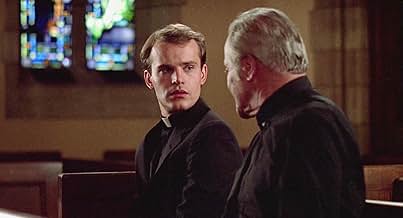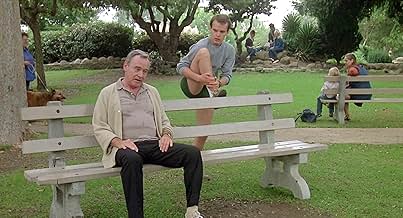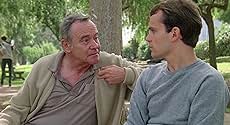IMDb RATING
6.7/10
1.2K
YOUR RATING
A popular Connecticut priest shields a seminary rebel from the wrath of a stern monsignor.A popular Connecticut priest shields a seminary rebel from the wrath of a stern monsignor.A popular Connecticut priest shields a seminary rebel from the wrath of a stern monsignor.
- Awards
- 1 win total
Featured reviews
Jack Lemmon shines as Father Farley, a spineless priest who'll say anything to anyone if it makes his life easier. Through a series of circumstances, he has to face himself as a result of being "assigned" Mark Dolson as a deacon.
When I first watched this movie, I was disappointed by the ending, because it didn't seem to resolve the main issue (which concerns Mark Dolson). But eventually I realized that it issue was Father Farley, and his spinelessness, and Mark Dolson was merely the means by which Farley is brought to terms with himself.
My second favorite movie of all time.
When I first watched this movie, I was disappointed by the ending, because it didn't seem to resolve the main issue (which concerns Mark Dolson). But eventually I realized that it issue was Father Farley, and his spinelessness, and Mark Dolson was merely the means by which Farley is brought to terms with himself.
My second favorite movie of all time.
Pity the poor congregation of St. Francis Parish, subject to "dialogue sermons" (what???), autobiographical psycho-babble and in the end, self-righteous calls to rise up against the local Church hierarchy. If things are really like this in the Catholic Church today, its enough to make this lapsed Catholic stay that way for a long time. That said, and hoping that this does not mirror reality, the movie works as entertainment, largely due to the performances of the two main characters. Jack Lemmon is delightful and convincing as a lonely priest who has found strategies (some decent ones, some hurtful) to survive who takes on the task of mentoring and tempering the well-meaning but naive passions of a young seminarian, also well played. The big casualty is in the one-dimensionality of the "heavy" played by Charles Durning, and perhaps of all of his cronies as well. Well, Catholic bashing is nothing new, mostly by ex-Catholics, but it always diminishes the dialogue such issues could provoke. However, there is more to the movie than this, especially in some very good characterizations of Catholic lay people, Louise Latham's housekeeper in particular.
Given all the revelations of sex abuse in the Catholic Church, Mass Appeal in its
own way is as dated as Going My Way in its picture of the Catholic Church and its
inner workings. Still the relationship of Jack Lemmon and Zeljko Ivanek isn't
exactly Bing Crosby and Barry Fitzgerald.
Playwright Bill C. Davis was hired to expand for the screen his two person play which 212 performances on Broadway in the 1981-82 season. It would hardly do to fill 100+ minutes of screen time with two priests just talking. Still the main focus is on popular parish priest Jack Lemmon and Zeljko Ivanek who is quite the oddball rebel at the seminary.
The monsignor in charge of the seminary Charles Durning wants Lemmon to take this kid in hand and explain the facts of life to him otherwise his ambition to be a priest will never be fulfilled. But as these two go back and forth one starts to wonder who is changing who.
On stage it worked to have the forces of repression as Ivanek sees them just be in the abstract. But for the screen Durning's role is critical in that the audience has to have the forces of oppression be personalized. Otherwise it would not have worked.
What the issues are I won't reveal, but as I said the sex abuse scandals have really dated Mass Appeal. Still it's a fine film with great performances from Lemmon, Ivanek, and Durning.
Playwright Bill C. Davis was hired to expand for the screen his two person play which 212 performances on Broadway in the 1981-82 season. It would hardly do to fill 100+ minutes of screen time with two priests just talking. Still the main focus is on popular parish priest Jack Lemmon and Zeljko Ivanek who is quite the oddball rebel at the seminary.
The monsignor in charge of the seminary Charles Durning wants Lemmon to take this kid in hand and explain the facts of life to him otherwise his ambition to be a priest will never be fulfilled. But as these two go back and forth one starts to wonder who is changing who.
On stage it worked to have the forces of repression as Ivanek sees them just be in the abstract. But for the screen Durning's role is critical in that the audience has to have the forces of oppression be personalized. Otherwise it would not have worked.
What the issues are I won't reveal, but as I said the sex abuse scandals have really dated Mass Appeal. Still it's a fine film with great performances from Lemmon, Ivanek, and Durning.
"Mass Appeal" is enjoyable on several levels. It works as an examination of the depth of contemporary religious beliefs and their current role in our society, as an indictment of an inflexible system (the Catholic church), and as a comment on the travails of two very different men (ostensibly of the same "cloth") seeking spiritual happiness. Unfortunately, as a "mass appeal" film, not all of the issues are satisfactorily handled, but the film is entertaining nonetheless. Greg Cundiff's excellent review neatly summarizes some key plot issues and holes. For example, I found Ivanek's/Dolson's devotion and desire compelling, but what on earth would make him think that a parish of strangers would listen to his excoriations and then embrace him as their pastor? I agree with Cundiff that the lack of clarity surrounding this fundamental plot point does not help the film. I was also disappointed that Durning's character was unambiguously drawn as the heavy. A more balanced approach may have helped here. Farley's attempt at leading a discussion of the role of women priests is unusually framed, but ultimately leaves the viewer desiring a more compelling resolution to the issue.
Strongly on the plus side, Lemmon is an excellent choice for the lead (whi ch allows him to display his comic and dramatic talents equally). Farley's story is as compelling as Dolson's, and Lemmon squeezes every drop of drama from the script. His final "mass appeal" is quite affecting. Ivanek is intense as Dolson, but Charles Durning's role could be played by anyone. The film is nicely "shot" and has an exhilarating soundtrack at points.
A "7" out of "10."
Strongly on the plus side, Lemmon is an excellent choice for the lead (whi ch allows him to display his comic and dramatic talents equally). Farley's story is as compelling as Dolson's, and Lemmon squeezes every drop of drama from the script. His final "mass appeal" is quite affecting. Ivanek is intense as Dolson, but Charles Durning's role could be played by anyone. The film is nicely "shot" and has an exhilarating soundtrack at points.
A "7" out of "10."
Father Farley drinks a little. He also goes to the races, is bad with first names, and tells "little lies" to get him out of tricky situations, like those involving domestic quarrels and slideshows with Monsignor Burke. But his parish loves him. Then he is assigned to look after a passionate young deacon who challenges him to step out of his blissful rut.
Jack Lemmon gives a very lived-in, often moving performance as Father Farley, and the best moments of "Mass Appeal" give us a chance to see Lemmon in his seriocomic element. But the film as a whole feels less smooth. Though it raises questions about saying what one believes versus being popular, "Mass Appeal" struggles to find a balance of its own, whether it wants to be a Neil Simon-style light comedy or a searing examination of the Catholic Church today.
Still, "Mass Appeal" is more good than not. It deals knowingly with the concepts of Catholicism, and hones in on the charms and pitfalls of the parochial life with small-bore detail. "Did I tell you about the coughs?" Father Farley tells the deacon, Mark Dolson (Zeljko Ivanek), cluing him in on one of the telltale signs a sermon-giver is losing his congregation. When giving a sermon, never say "you," always say "we." Less confrontational that way.
The problem is that Dolson is all about confrontation. He already has Monsignor Burke (Charles Durning) fuming about being called a "homophobic autocrat" for kicking out a pair of seminarians suspected of sleeping together. Dolson speaks in favor of the ordination of women, tells Farley he'd be a better priest if he drank less, and calls out the congregation during one sermon for their mink hats and blue hair.
Farley squirms from his seat behind the altar while his acolyte implodes in the pulpit, ignoring his hacking throng. "We'll be going out the back today," he mutters to an altar boy in a classic Lemmon aside.
My main problem with "Mass Appeal," as noted by other posters, was that I was never sold on Dolson's reason for becoming a priest. He seems more like a mouthpiece for Bill C. Davis, adapting his Broadway play, to vocalize his concerns about the church's position on wedge issues like celibate gays in the clergy. Ivanek plays him as a character who acts more from anger than conviction, which seems a wrong choice. You don't have to be an autocratic homophobe to think this guy, celibate or not, will have problems with his priestly office somewhere down the road.
There's a frostiness to Ivanek's scenes with Lemmon that's off-putting, and the sentiment squeezed out of them sometimes feels stagey and forced. Director Glenn Jordan worked mostly in TV movies, and while he frames his scenes well and builds a good pace, there's often a pedestrian quality to the overall presentation. You can't stick in a car chase with a film like this, but there are too many talking-head shots.
The best parts of the movie are Lemmon's scenes with Monsignor Burke, which Durning invests with his typical mix of menace and affability. Not just a heavy, Durning plays him as a bit lost. Burke really likes Farley but alienates him at the same time with his bullying, as subservience is the only kind of devotion this sacerdotal relic understands. When Dolson calls him out on his harshness, Burke targets him for his frankness and justifies his vendetta as churchly devotion.
One wishes Davis made Burke more than the bad guy, perhaps found a way to make him a more active player in the spiritual journeys of Farley and Dolson, journeys left largely unexplored here. Instead he's made the object of anger for the other characters, and even has a wormy henchman on call. Didn't Burke have his days as a lost seminarian, too?
"Mass Appeal" gets by with its light charm, its probing and atypical focus on the Catholic faith in practice, and most especially Lemmon's strong central performance. Even if you don't like Lemmon in every film of his you see, it's safe to say you will like him here. Sometimes it takes a lesser film to display a great actor, and that's what you get here.
Jack Lemmon gives a very lived-in, often moving performance as Father Farley, and the best moments of "Mass Appeal" give us a chance to see Lemmon in his seriocomic element. But the film as a whole feels less smooth. Though it raises questions about saying what one believes versus being popular, "Mass Appeal" struggles to find a balance of its own, whether it wants to be a Neil Simon-style light comedy or a searing examination of the Catholic Church today.
Still, "Mass Appeal" is more good than not. It deals knowingly with the concepts of Catholicism, and hones in on the charms and pitfalls of the parochial life with small-bore detail. "Did I tell you about the coughs?" Father Farley tells the deacon, Mark Dolson (Zeljko Ivanek), cluing him in on one of the telltale signs a sermon-giver is losing his congregation. When giving a sermon, never say "you," always say "we." Less confrontational that way.
The problem is that Dolson is all about confrontation. He already has Monsignor Burke (Charles Durning) fuming about being called a "homophobic autocrat" for kicking out a pair of seminarians suspected of sleeping together. Dolson speaks in favor of the ordination of women, tells Farley he'd be a better priest if he drank less, and calls out the congregation during one sermon for their mink hats and blue hair.
Farley squirms from his seat behind the altar while his acolyte implodes in the pulpit, ignoring his hacking throng. "We'll be going out the back today," he mutters to an altar boy in a classic Lemmon aside.
My main problem with "Mass Appeal," as noted by other posters, was that I was never sold on Dolson's reason for becoming a priest. He seems more like a mouthpiece for Bill C. Davis, adapting his Broadway play, to vocalize his concerns about the church's position on wedge issues like celibate gays in the clergy. Ivanek plays him as a character who acts more from anger than conviction, which seems a wrong choice. You don't have to be an autocratic homophobe to think this guy, celibate or not, will have problems with his priestly office somewhere down the road.
There's a frostiness to Ivanek's scenes with Lemmon that's off-putting, and the sentiment squeezed out of them sometimes feels stagey and forced. Director Glenn Jordan worked mostly in TV movies, and while he frames his scenes well and builds a good pace, there's often a pedestrian quality to the overall presentation. You can't stick in a car chase with a film like this, but there are too many talking-head shots.
The best parts of the movie are Lemmon's scenes with Monsignor Burke, which Durning invests with his typical mix of menace and affability. Not just a heavy, Durning plays him as a bit lost. Burke really likes Farley but alienates him at the same time with his bullying, as subservience is the only kind of devotion this sacerdotal relic understands. When Dolson calls him out on his harshness, Burke targets him for his frankness and justifies his vendetta as churchly devotion.
One wishes Davis made Burke more than the bad guy, perhaps found a way to make him a more active player in the spiritual journeys of Farley and Dolson, journeys left largely unexplored here. Instead he's made the object of anger for the other characters, and even has a wormy henchman on call. Didn't Burke have his days as a lost seminarian, too?
"Mass Appeal" gets by with its light charm, its probing and atypical focus on the Catholic faith in practice, and most especially Lemmon's strong central performance. Even if you don't like Lemmon in every film of his you see, it's safe to say you will like him here. Sometimes it takes a lesser film to display a great actor, and that's what you get here.
Did you know
- TriviaAccording to actor Zeljko Ivanek, the fish sermon scene was shot 15 times from three different angles. Although Ivanek considers the last take the best, most of it didn't make the final cut because it was too emotionally jarring for the audience.
- Quotes
Father Tim Farley: You're a lunatic! And Christ NEEDS lunatics. But the trouble with lunatics is, they don't know how to survive.
- Crazy creditsThis picture is dedicated to the memory of Ray A. Kroc.
- ConnectionsFeatured in At the Movies: Dune/Starman/Mass Appeal/Runaway (1984)
- How long is Mass Appeal?Powered by Alexa
Details
- Release date
- Country of origin
- Language
- Also known as
- Die Auseinandersetzung
- Filming locations
- Claremont, California, USA(myself, as I was an extra in this film)
- Production companies
- See more company credits at IMDbPro
Box office
- Budget
- $7,000,000 (estimated)
- Gross US & Canada
- $1,945,658
- Gross worldwide
- $1,945,658
Contribute to this page
Suggest an edit or add missing content


